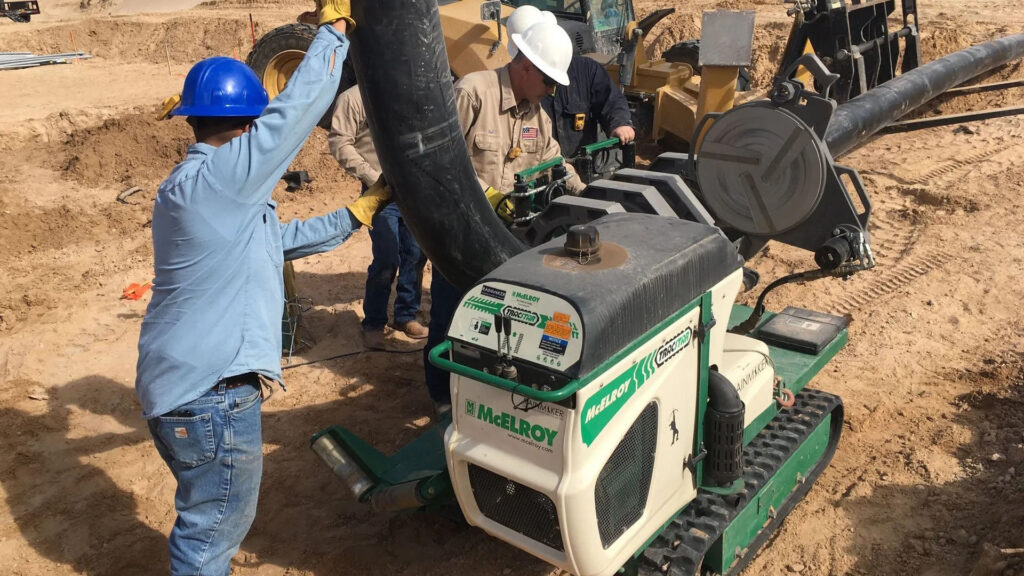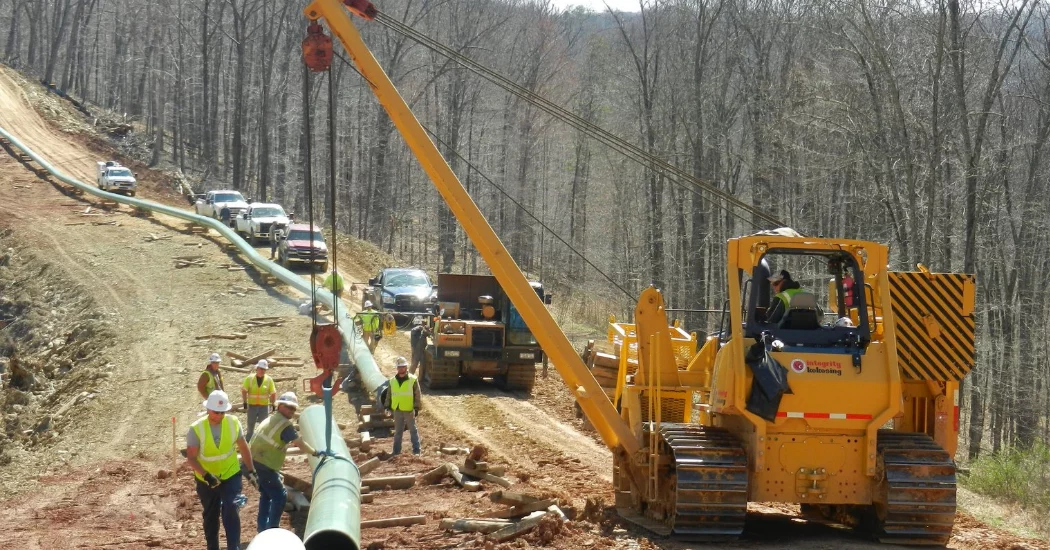The Essential Overview to Recognizing Pipeline Construction Solutions and Their Relevance
Pipeline Construction solutions are basic to the transportation of crucial resources such as water, gas, and oil. These solutions involve precise preparation and execution, sticking to rigid security and environmental criteria. As the market adapts to contemporary obstacles, recognizing its effects and components becomes significantly vital. What variables add to the growing importance of these solutions in today's economic climate? The following sections will certainly discover these crucial aspects.
Summary of Pipeline Construction Providers
Pipeline Construction services encompass a variety of tasks essential for the installation and maintenance of pipes made use of to deliver various substances, consisting of water, gas, and oil. These solutions are important for assuring the secure and reliable motion of resources from one location to one more. The process usually begins with extensive preparation and layout, which takes into consideration regulative demands, ecological considerations, and logistical challenges.
Excavation and grading of the land are performed to prepare the website for Pipeline setup as soon as preparation is total. This is adhered to by the actual laying of the pipelines, which involves welding or joining areas with each other to produce a continuous flow course. After installment, strenuous screening is executed to guarantee integrity and safety. Upkeep solutions are also provided to address any kind of concerns that may arise in time. In general, Pipeline Construction solutions play a critical function in sustaining framework for energy and water distribution.
Secret Parts of Pipeline Construction
An effective Pipeline Construction project counts on numerous crucial parts that guarantee the risk-free and reliable installation of the Pipeline system. Complete site evaluations are essential, as they determine the environmental and geographical elements that may influence Construction. Next, the selection of suitable products, such as pipelines and fittings, is essential for protecting resilience and compatibility with the delivered substances.
In addition, progressed Construction techniques, including trenchless modern technology and directional drilling, boost effectiveness and reduce ecological impact. Efficient project administration is another important part, collaborating labor, equipment, and timelines to satisfy job objectives.
In addition, interaction amongst stakeholders, consisting of designers, service providers, and regional authorities, warranties alignment on job specs and needs. Lastly, detailed quality control procedures throughout the Construction process make certain conformity with market requirements and optimize the Pipeline's operational life-span. Collectively, these parts create the backbone of an effective Pipeline Construction task.
Safety And Security Requirements and Rules in Pipeline Construction

Governing bodies, such as the Occupational Safety And Security and Health And Wellness Administration (OSHA) and the Pipeline and Hazardous Materials Security Administration (PHMSA), stated certain needs that regulate Construction practices. These include methods for tools usage, employee training, and emergency action treatments. By executing these criteria, Construction companies not only safeguard their employees however also safe public count on. Ultimately, extensive precaution contribute to the lasting success of Pipeline jobs, guaranteeing they satisfy both functional and ecological expectations.
Environmental Factors To Consider in Pipeline Projects

Environmental factors to consider are indispensable to the planning and implementation of Pipeline tasks. These jobs should evaluate prospective effects on ecological communities, water resources, and local wildlife. Conducting detailed environmental influence analyses (EIAs) is important, enabling stakeholders to recognize and minimize dangers before Construction begins.
Securing delicate areas, such as wetlands and habitats, often calls for executing details design attributes or alternative routing to decrease disruption. In addition, Pipeline operators are charged with establishing techniques for stopping leaks and spills, which can have disastrous impacts on the atmosphere.
Interaction with neighborhood communities is necessary, as public concerns can result in job adjustments that enhance ecological security. Compliance with guidelines set by environmental companies ensures that jobs meet sustainability standards, fostering a balance in between framework demands and eco-friendly conservation. Ultimately, attending to ecological considerations not just safeguards nature however likewise promotes area count on and project viability.
The Function of Innovation in Pipeline Construction
Modern technology plays an essential duty in contemporary Pipeline Construction, enhancing efficiency and precision. Advanced checking techniques enable for precise preparation and implementation, decreasing environmental impact and task delays. Additionally, the combination of automation and robotics streamlines procedures, lowering labor expenses and enhancing safety on Construction sites.
Advanced Evaluating Methods
Advanced checking methods play an essential role in the successful execution of Pipeline Construction projects. These approaches utilize innovative technology to guarantee precise mapping and evaluation of the terrain where pipes will be set up. Strategies such as Geographic Details Solution (GIS), LiDAR (Light Detection and Ranging), and 3D modeling make it possible for engineers to visualize and examine the landscape, identifying potential barriers and environmental issues. By making use of these sophisticated devices, teams can improve precision ready and alignment, significantly reducing the threat of mistakes throughout Construction. Additionally, real-time information collection permits prompt modifications and educated decision-making throughout the project lifecycle. Eventually, these evaluating innovations add to boosted effectiveness, security, and sustainability in Pipeline Construction efforts.
Automation and Robotics

Economic Impact of Pipeline Facilities
Pipeline facilities plays a vital duty in facilitating and shaping local economic situations trade. By providing a trusted methods of transferring oil, gas, and other products, pipes minimize transportation prices and enhance supply chain performance. This facilities draws in financial investment, boosts work development, and cultivates economic development in surrounding areas.
The Construction and maintenance of pipelines add considerably to regional economies, creating various work possibilities in different sectors, from engineering to labor. The increase of jobs frequently leads to raised spending in regional businesses, further reinforcing financial task.
Additionally, pipes boost power safety by making sure a stable supply of resources, which is critical for residential needs and industrial operations. As regions become adjoined with Pipeline networks, they get accessibility to broader markets, enhancing competition and financial durability. As a result, the financial influence of Pipeline infrastructure is multifaceted, affecting both instant regional economic climates and broader regional development.
Future Fads in Pipeline Construction Services
The future of Pipeline Construction services is advancing in feedback to technological advancements, governing changes, and expanding environmental considerations. Developments such as robotics and drones are enhancing assessment and maintenance procedures, enhancing safety and efficiency. Automation is poised to minimize labor expenses and enhance precision in Construction procedures. Furthermore, the raising emphasis on sustainability is prompting companies to adopt eco-friendly products and methods, aligning with international initiatives to reduce my blog carbon footprints.
Regulative structures are also adapting to attend official website to ecological influences, promoting greater transparency and liability in Pipeline jobs. Furthermore, the assimilation of smart modern technologies, consisting of real-time monitoring systems, is anticipated to enhance the dependability and efficiency of Pipeline networks. As energy demands change toward eco-friendly sources, Pipeline Construction services will likely see a rise in jobs connected to biofuels and hydrogen transportation. In general, these fads suggest a transformative duration for the Pipeline Construction industry, concentrated on technology and sustainability.
Often Asked Inquiries
What Types of Pipelines Are Frequently Built?
Numerous kinds of pipelines are commonly created, consisting of oil, water, sewer, and gas pipes - Pipeline Construction Services. Each offers unique objectives, helping with the transportation of vital sources throughout areas while sticking to safety and environmental laws
How much time Does a Common Pipeline Task Take?
The duration of a normal Pipeline job varies greatly, usually ranging from a number of months to a few years. Factors affecting this timeline include task intricacy, regulative authorizations, and ecological considerations that should be resolved.
That Controls Pipeline Construction Business?
Pipeline Construction firms are managed by different government, state, and neighborhood companies, consisting of the Pipeline and Hazardous Products Security Administration (PHMSA) and state utility compensations, making certain compliance with security and ecological requirements throughout the Construction process.
What Are Usual Materials Used in Pipeline Construction?
Usual materials used in Pipeline Construction include steel, polyethylene, and PVC. Each material uses distinct advantages such as toughness, resistance, and adaptability to deterioration, making them suitable for different applications in delivering fluids and gases.

How Are Pipeline Construction Prices Approximated?
Pipeline Construction expenses are approximated by examining factors such as material expenses, labor rates, project intricacy, ecological factors to consider, and governing demands (Pipeline Construction Services). Accurate price estimate guarantees effective budgeting and job planning throughout the Construction process
Pipeline Construction services encompass an array of tasks essential for the installment and maintenance of pipelines made use of to transport numerous materials, consisting of gas, water, and oil. A successful Pipeline Construction project counts on a number of key elements that assure the reliable and risk-free installation of the Pipeline system. Advanced checking techniques play a crucial duty in the successful execution of Pipeline Construction projects. Different kinds of pipelines are commonly constructed, consisting of oil, water, sewage, and gas pipes. Pipeline Construction costs are Going Here estimated by analyzing variables such as product expenses, labor prices, job complexity, environmental factors to consider, and governing needs.